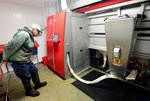


Andy and Linda Styger are looking forward to spending their days taking long naps, something unheard of on a busy dairy farm until now.
The third-generation Chehalis farmers have become the first in Washington to use robots to milk their dairy cows.
Just weeks ago, the Stygers installed two Lely Astronaut automated robots, which milk the farm’s 75 cows up to four times daily and provide information specific to each animal. In a traditional parlor, cows are milked just twice a day.
The robots increase the milk’s quality and yield while dramatically decreasing the amount of time and work it takes to produce products for Organic Valley and Darigold, as the 250-acre farm has for years.
Last year, the couple said they spent about nine hours a day milking. Now, they’ll have it down to just one hour each day, once they finish learning the new technology.
“That’ll give us eight hours to take a nap or do something else,” Linda Styger said.
Additionally, she said, the robots milk 24 hours a day, seven days a week and don’t ever call in sick, which eliminates the need to hire additional help.
With the automated machinery, the cows choose to come into the barn to be milked when they please. Already, about 80 percent of the herd have learned to come to the robot on their own.
“It’s amazing,” Linda said. “They seem calmer now.”
The computer first reads a collar on the cow, which identifies the animal and provides 120 pieces of information on it before cleaning it. The machine then uses lasers to connect to the cows and perform the milking without human assistance. The milk is pumped away and the cow is again cleaned before being released.
“Talk about buying a Lamborghini,” Linda said. “It’s a good investment.”
The Stygers now have a computerized record with hundreds of facts on each individual animal, including what it has eaten, its weight and when it can breed, as well as milk yield and quality.
“It tells you when you have a cow with an issue,” Linda said. “There’s a lot of information that I can use to become a better dairy farmer.”
The Stygers said they are already using about 19 pieces of information provided by the system daily.
When the robot finds a problem that requires human assistance, it calls the Stygers on their cellphones, which, Linda said, is great until the phone starts ringing in the middle of the night. Even when the robot did wake them, they found the problem was the operator, not the machine, she said.
And when the couple encountered computer problems, the Lely fixed the issue overnight from Holland via the Internet.
Styger said innovations in technology like the milking robots can save a small dairy time and labor as well as eliminate challenges with finding good hired help.
“Hopefully, this’ll improve our lives,” Linda Styger said.
Styger said they will have an open house to share the new technology with other farmers in June, but she hopes people will not visit until then so they have time to learn the new system.
“It still amazes me,” Linda said.
Andy’s grandfather bought the farm on Tune Road in 1919 after coming from Switzerland for a logging job in Mineral.
“They were hard working people,” Andy said.
In the last century, the farm has experienced several technology changes, each making life a little easier for the family farmers.
“We’ve gone from milking by hand,” Linda said, “to a Lely Astronaut.”
The addition of the robots, she said, should allow them more time before they have to retire.
“This has made it easier to keep working,” Linda said. “Dairy farmers never quit.”
•••
Amy Nile: (360) 807-8235
twitter.com/AmyNileReports
www.facebook.com/AmyNileTheChronicle